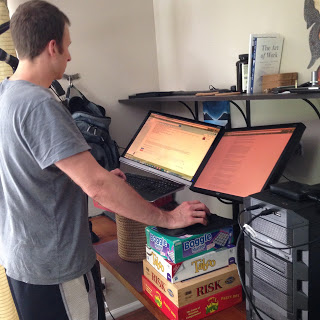I am Chris Jones and This is How I Work
 Today, I am interviewing Chris Jones for the “How I Work” series. Chris is currently a 2nd year PhD candidate at the University of North Carolina at Chapel Hill. He received his B.S. in Environmental Science with a minor in Mathematics from the University of North Carolina at Chapel Hill. His research interests are in forest pests and pathogens; specifically, their effect on ecosystem processes and services. In this realm, he is particularly interested in their effect on fire and carbon sequestration. His research is funded by a National Science Foundation Graduate Research Fellowship. He is also very passionate about science communication and grad student issues. You can find Chris on twitter @ChrisM_Jones or at RockYourResearch.com.
Today, I am interviewing Chris Jones for the “How I Work” series. Chris is currently a 2nd year PhD candidate at the University of North Carolina at Chapel Hill. He received his B.S. in Environmental Science with a minor in Mathematics from the University of North Carolina at Chapel Hill. His research interests are in forest pests and pathogens; specifically, their effect on ecosystem processes and services. In this realm, he is particularly interested in their effect on fire and carbon sequestration. His research is funded by a National Science Foundation Graduate Research Fellowship. He is also very passionate about science communication and grad student issues. You can find Chris on twitter @ChrisM_Jones or at RockYourResearch.com.
Current Job: Phd Student at UNC @ Chapel Hill in Geography (NSF Graduate Research Fellow)
Current Location: Chapel Hill, North Carolina
Current mobile device: LG G2 (will be switching to an I-phone next contract cycle)
Current computer: I built my own computer (I7 processor, 32 GB RAM, 2 TB Hard drive, good video card). I use Windows 8 as my OS due to ArcGIS only working on Windows.
Can you briefly explain your current situation and research to us?
I am currently a PhD student in Geography at the University of North Carolina at Chapel Hill funded by a National Science Foundation Graduate Research Fellowship. This fall I will start my 3rd year in my PhD program. I will take my comprehensive exams and defend my dissertation proposal this fall. My research is on an invasive forest pathogen, Phytophthora ramorum, in California. It is the pathogen responsible for sudden oak death, a disease that kills oak and tanoak trees that are iconic parts of the California landscape. I use computational simulations to understand the effects of P. ramorum on wildfire and forest succession. I am particular interested in how this pathogen can change fire frequency and magnitude and how the interaction between wildfire and the pathogen is likely to change the species that make up the forests in California.
I am also deeply interested in graduate student issues and have a recently launched website on this topic. I am currently working on a podcast by the same name that should launch mid to late July. I love good science communication and think that science needs to be written in a more fun, publicly understandable way.
What tools, apps and software are essential to your workflow?
I use R studio for all of my statistics and data manipulation and analysis. I use ArcGIS for all of my map making and some processing. Evernote is where I store everything about my life and PhD. I use it for a lab notebook to keep track of day to day tasks related to my research. I also use it for journaling, storing receipts, taxes, etc. I keep it very organized using tags. I use Gmail, google calendar and Calendly to schedule appointments and keep track of meetings and obligations. Everything I do integrates well with Gmail and Google calendar. I use Nozbe for project and task management.
What does your workspace setup look like?
I work only in my home office. I am currently trying out standing at my desk and so far it has improved productivity. The modification to make it a standing desk is crude (in so far as I used game boxes) but I didn’t want to commit time and money into something I wouldn’t enjoy. I am currently on week 3 of my 4 week trial. If I still love it after 4 weeks I will raise the desk permanently.
What is your best advice for productive academic work?
List all of your current projects. Then decide what task are necessary to complete each project. Break these tasks into chunks that you can complete in one day. Then decide which tasks on each project are the next one you need to accomplish and start working through them. Make sure this list is stored somewhere it won’t be lost and that you will always be able to access when you need it. Do 1 or 2 of these essential tasks per day and you will feel much more accomplished than if you jump from project to project.
Also keep email to the bare minimum. I check email twice a day.
How do you keep an overview of projects and tasks?
I use Nozbe to manage all of my projects. I list every task that needs to be accomplished from start to finish of the project. It synchs with Evernote and Dropbox so I can link to the files that I need to complete the task or project. I can also email myself a task. This app allows me to structure my workflow and have a broad overview of all of my projects, both personal and professional. My wife (who is also a graduate student) can even assign me a task to do, which works out great for us both! I can see it when it is convenient for me rather than having her interrupt me while I am concentrating on an important task. I can then do the task and she can see that it is done when it is convenient for her. She uses it too, so I can assign tasks to her in the same manner. We use it for everything, including grocery lists. It has an app for all major platforms. It also integrates with Gmail and Google calendar. If I set a date and time for doing a task it blocks that task out in my calendar so I don’t double book myself. I treat appointments with myself the same way I treat appointments with others.
Besides phone and computer, do you use other technological tools in work and daily life?
I love my kindle paper white for reading books. It doesn’t handle pdf figures well so it doesn’t work well for papers. I tend to use my tablet for reading pdfs.
My brother in law bought us a Neato vacuum. It is a small robot like a Roomba. It vacuums the floor for us on a schedule and all I need to do is empty the dirt bin when it is done. This is pricey if you have to buy one but I couldn’t imagine not having it now.
Which skill makes you stand out as an academic?
This is a hard question to answer. I would say it is my ability to automate most of my processing to allow me to get more done in less time. My computer can be processing my data and running models (sometimes this takes 3-7 days) while I am able to get other work done. Putting in the time up front to have automated processes saves me so much time now and in the future.
I also take really good notes so that I know what I did and how I did it. This again takes time now but saves lots of time later.
What do you listen to when you work?
I listen to Focus@Will. It is music designed for productivity. I personally listen to the drums and hums on medium intensity. It works best for me and keeps me focused. I find other music distracting.
What are you currently reading?
I am currently reading Free to Learn by Peter Gray. I have a 7 month old and am interested in how children learn. I am also reading the Four hour work week by Tim Ferris because it inspires me to live a better life now rather than waiting for someday. I listen to a lot of audio books as well. I make reading a priority in my life. I read for 20 minutes before bed and while my son naps because he doesn’t nap by himself yet.
Are you more of an introvert or extrovert? How does this influence your working habits?
I am more of an introvert. I am working on being more outgoing and meeting more people. I can’t work around other people though. I am like one of those little dogs (a picture of a pug turning its head back and forth would be funny here) that is constantly looking at everything going on around me. I find doing work anywhere with any movement or noise very distracting. I need to work during a quiet time or I am very ineffective. I think that is a big weakness and will make it hard to work in a job that would require me to be there in person.
What’s your sleep routine like?
I go to bed between 7 and 8 pm and wake up at 2 am every day. This allows me to work for many hours while the house is quiet, before my son wakes up. There are exceptions to this but they are rare.
What’s your work routine like?
I get up and start a 30 minute inspirational podcast. While that is playing I drink a quart of water, do 10 minutes of yoga, do 8 minutes of a Tabata workout, make and drink a protein shake, and take my vitamins. This wakes me up and starts my day with lots of energy.
I then write 15 minutes on my dissertation (whether I want to or not) using a timer.
Then I check my project manager where I have laid out all of the tasks that I want to get done that week. I choose the 1st and 2nd most important tasks that I want to get done today. I then get to work on knocking those out. While doing this I use the Pomodoro technique, where I work for 25 minutes then take a short break and repeat. During the break I move around to get my energy back up.
I usually work until about 8 am. This is roughly when my 7 month old wakes up and I go see him. That is usually the end of my workday. I work approximately 42 hours a week during this time because I do it 7 days a week. I do have meetings and other times that I work if it is necessary to get a time sensitive task done. I find that I get more done in this amount of time than I did my first year and half of graduate school working 70 to 90 hours a week during normal working hours.
What’s the best advice you ever received?
Efficiency does not mean effectiveness. If you are doing a task really efficiently but that task doesn’t need to be done then you aren’t effective. Effectiveness is knowing which tasks are absolutely essential and then being efficient at those tasks.

